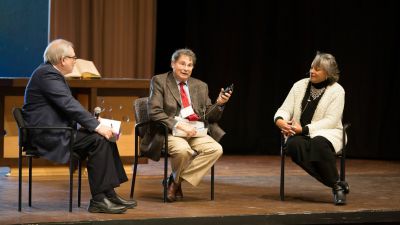Civil rights experiences presented on Martin Luther King Jr. Day at Concordia

Two professionals with unique experiences related to civil rights spoke at Concordia University, Nebraska on Martin Luther King Jr. Day, Jan. 18, 2016.
Dr. Lesa Covington Clarkson, associate professor and senior graduate faculty member in the mathematics and science / technology / engineering / mathematics (STEM) area at the University of Minnesota, presented the first session. Alvin Benn, who has been a reporter in the South for more than 50 years and covered some of the major civil rights events of the 1960s, then joined her in a panel discussion. Benn closed out the day with an individual presentation about his experiences living and reporting the news in Selma, Alabama, for more than 35 years.
A panel discussion called “The Current State of Civil Rights and Racial Issues in the U.S.” featured both speakers. Concordia’s Assistant Professor of Global Studies Tobin Beck asked questions about racial relations in the United States.
“Race is still an uncomfortable topic for people,” said Covington Clarkson. “Be OK to talk about it. Be OK to be uncomfortable because not everybody has the answers.”
Covington Clarkson shared personal experiences of raising her children in a culture where people treat others differently and disrespectfully based on the color of their skin and other differences. For example, she had conversations with her children as they were growing up about how they should respond to and interact with police officers who pull them over, pointing out her confidence that, due to the color of their skin, they were, in fact, going to be pulled over.
Covington Clarkson believes that respecting others is key to the United States making progress regarding the issue of race.
“Respect is … something that has to be practiced,” Covington Clarkson said. “It’s something that once you model it, people around you will start doing it as well. … It has to be part of who we are right now.”
She also had advice for the students in attendance: “You have to think about what your contributions are going to be. Once you decide who you are and what you want to do, you are no longer based upon your physical appearance—find your passion.”
Benn shared stories of his time living in Selma when race-related tension was evident. For example, he shared unfair ways that the white politicians tried to keep blacks from being able to have a say by voting for leaders in their community. For example, black people were asked to identify the number of bubbles on a bar of soap, and when they couldn’t—even though the white politicians couldn’t either—they were told they couldn’t vote.
Benn admits racial tension is still very evident even today. He lived and raised children in a nearly all black community and interacted with both black and white power players, including leaders of the Ku Klux Klan, as he fulfilled his reporting responsibilities. Benn has seen schools transition from segregated to integrated to nearly completely segregated again in both public and private schools in his city.
Benn agrees that basic respect for other people is necessary to help move our country forward to better race relations and added that simply smiling at someone can make a significant difference.
About the Presenters
Covington Clarkson’s research interest is identifying successful strategies to increase student achievement, particularly among underrepresented student groups. She shared an individual presentation titled “Sufficiently Challenged, Enormously Blessed.”
Covington Clarkson is the first African American to obtain her Ph.D. in mathematics education from the University of Minnesota. Before completing her doctorate, she earned a B.A. from Concordia University, Nebraska and a master’s degree from California State University. She has been a math educator for 37 years. Clarkson is also a member of Concordia’s Board of Regents.
Benn, a former Marine who lives in Selma, Alabama, has been a journalist in the South for more than 50 years. His autobiography, “Reporter: Covering Civil Rights … and Wrongs in Dixie,” was published in 2006. He spoke about his career as a reporter and his experiences with civil rights during his presentation.
Benn has received numerous awards including the “Lifetime Achievement Award” from the Alabama Press Association and the “Distinguished Alabama Community Journalist” award given by Auburn University. He and his team were nominated for a Pulitzer Prize in 1974 while he was managing editor of the Natchez (Mississippi) Democrat newspaper.
Both presentations and the panel discussion were part of the Looking Beyond Speaker Series, which is made possible through an ongoing gift from Martin and Regina Maehr. The series was created to present diverse speakers and ideas to Concordia students and the Seward community.